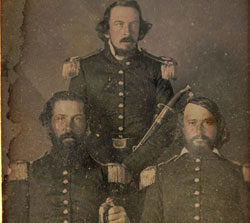
University of Richmond President Ed Ayers says the enemy of
Civil War history is everything people think they know about the conflict. But as the country continues to mark the
war's 150th anniversary the historian says that has to change, not
just so that we know our history but so we can talk about important
contemporary issues such as race, gender and even who we are as Americans.
"The Civil War is our greatest point of leverage to talk
about these issues," Ayers said.
"I became a historian of 19th Century America not to run
away from contemporary issues."
Ayers presented the annual lecture of Duke's Center for the Study of Race, Ethnicity
and Gender in the Social Sciences Friday afternoon in the Gothic Reading
Room. As president of a major university
in the old capital of the former Confederacy, Ayers has been in a key position to
help shape the themes of the anniversary of the Civil War, which began in 1861. He is author of numerous books on the Civil War, including "In The Presence of Mine Enemies: War in the Heart of America, 1859-1863," which won the Bancroft Prize for history.
And his involvement with a highly praised digital history collection underscores how
humanities scholars can use technology to mine old data in new ways and make
them accessible to the public.
Two of the outstanding questions that Ayers said the data are
providing new evidence for are the origins of the conflict and how a fight over
the union was transformed into a larger conflict for freedom and emancipation.
Using electoral data
and digitized records of secession debates, Ayers challenged common ideas
about the 1860 presidential election and its aftermath. Nobody was voting for war in 1860, he said,
and schisms were found throughout both the North and South.
"Nobody knew what it was they were voting for,"
Ayers said. "Lincoln and the
Republicans disavowed that they were going after slavery, but throughout the
South newspapers insisted they were intent on destroying slavery. The two sides talked through each other. Every political party had its own newspaper
and its own interpretation."
Key to the South was a segment of voters who supported the
Constitutional Whig party in the election.
These were people -- very strong in North Carolina -- who opposed secession but supported slavery, Ayers said.
When radicals in South Carolina voted for secession immediately after
the election, one reason was to try to make this compromise position untenable.
"There's still this idea that the secession wasn't
about preserving slavery," Ayers said.
"It's not true. They spoke
the language of state's rights, but it shouldn't be surprising that the talk of
rights and slavery were tied closely together."
The records of the important Virginia secession debates -- held many months after South Carolina's vote -- underscore the centrality of
slavery in the debate. The topic was
raised more than 1,400 times in speeches, literally once every other page.
Ayers noted that the Virginia debates, as well as similar
ones that followed in North Carolina, lacked the fire of those in South
Carolina and the deep South. "They
knew where the war would actually be fought," he said. "Virginia and North Carolina lost more
men in the war than any other state.
They went into this crying, and they lost the most."
But what war would it be?
Ayers said it was important that the Civil War anniversary not
overshadow a second just as significant anniversary -- the emancipation of 3.5
million African-Americans, an event that occurred under circumstances unique in
world history.
Had the war ended in 1862 -- had Union Gen. George McClellan
succeeded as he should have in taking Richmond -- the war would have concluded
without emancipation, Ayers said. But a
combination of political, military and social factors as well as the bravery of
the slaves themselves, led to a conclusion that nobody at the start of the war
predicted.
The Richmond digital history includes another timeline showing the
movement of Union soldiers and accompanying efforts of slaves to race to Union
lines to win their freedom. This starts
in May 1861, even before the first infantry battle, when a handful of slaves
flee to Union soldiers in Hampton Roads, Va., and without explicit orders from
his superiors, Gen. Benjamin Butler accepts them.
"What the map shows is the determination of the slaves
to find freedom," he said.
"It's easy to romanticize this, and in fact in many of the cases it
wasn't a good outcome. But it shows the
incredible bravery of the slaves and how they helped transformed the nature of
the war."
Lincoln also came to believe that to defeat the Confederacy,
slavery had to be crushed. Ayers noted
that while much Civil War scholarship on emancipation focuses on the
personality and character of Lincoln, he believes more attention should be
placed on the military and political contexts that forced his actions. It was
through the system of slavery that the South was able to draw upon nearly all
adult white males and feed a vast army.
Ayers said his hope is for the Civil War anniversary to be
marked not by a celebration but with a feeling of empathy to understand
uncomfortable truths and to challenge long-standing myths surrounding the
conflict.
"Traditional Civil War history has smoothed out the
sharp edges," he said. "We
need to grapple with sharp edges, to talk honestly about issues of race and
feminism and social conflict 150 years ago. If we can do that, there's hope we can talk
honestly about these same issues now."
Ayers was introduced by Duke faculty members Kerry Haynie
and Paula McClain, co-directors of REGSS, an interdisciplinary center housed
within the Social Science Research Institute.